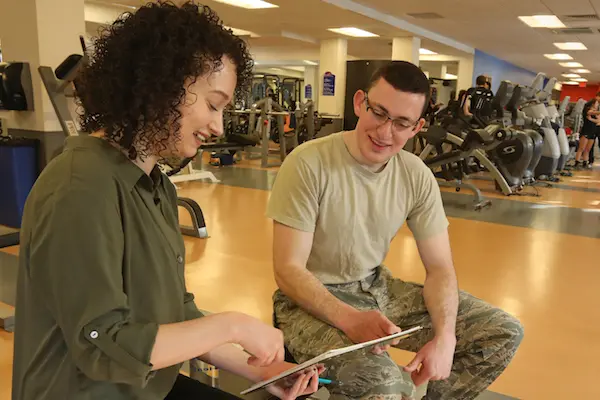Future Dietitians Gain Counseling Experience

05/03/2019
By Karen Angelo
As a cadet in the university’s Air Force Reserve Officer Training Corps (ROTC), Marco Saint-Louis must maintain a high level of fitness while taking a full load of classes. To help him stay on track, he turned to the nutrition and exercise counseling offered by students in the Zuckerberg College of Health Sciences.
Each week, Saint-Louis met with Master of Public Health (MPH) Dietetics students, who advise cadets on nutrition in the Health Assessment Laboratory.
“Based on how I ate for that week, the MPH students gave me recommendations to either improve or maintain what I was doing,” says Saint-Louis, a computer science major who is on track to become an active duty officer in the Air Force. “I learned that my water consumption was great. However, I was not eating enough during the day based on my high activity level.”
UMass Lowell Air Force ROTC Commander Jesse Jaramillo partnered with Zuckerberg College of Health Sciences faculty to deliver nutrition and exercise science education, counseling and training to cadets two years ago.
“We have two years of data that show that our nutrition and exercise efforts are working,” says Jaramillo, who is also a professor of aerospace studies. “Our cadets can struggle with body fat, pushups, situps and other requirements. After our first year of partnership, we helped 19 of 20 cadets meet the standards. The remaining cadet will eventually meet the requirements as well.”
Asst. Teaching Prof. Renee Barrile, who directs the MPH Dietetics program, says that the partnership is a natural way for the MPH students to gain experience and hours on campus before going into clinical sites.
“It made perfect sense for our students to share their knowledge to help the cadets and practice how to communicate and motivate as they prepare for their careers as dietitians,” she says.
Visiting Prof. Mary Kate Keyes oversees the MPH students as they advise cadets on topics such as choosing healthy foods in the dining halls, meeting micronutrient goals and drinking enough water.
MPH senior Federica Fiore counseled cadets one-on-one over nine weeks and followed their progress.
“As an aspiring dietitian, I got to practice counseling while seeing the results of the cadets over time,” says Fiore. “It was very rewarding and helped me prepare for my clinical rotations in health care facilities.”
The ROTC physical fitness training regimen was revamped, thanks to Asst. Teaching Prof. Kyle Coffey and his students. They evaluated the cadets’ current exercise programs and offered recommendations to help them achieve their goals.
Saint-Louis also took advantage of an eight-week fitness program, developed by exercise science faculty and staff from Campus Recreation and the Wellness Center, called Exercise is Medicine. Part of a national initiative, the program teaches students how exercise can improve their overall well-being by providing them with personal training sessions free of charge.
“The consistent exercise and the nutritional checkups made it very easy to stay on track,” Saint-Louis says.
Model of Success
Jaramillo says that the partnership with the Zuckerberg College of Health Sciences team has been so successful that he hopes to see it replicated at other universities.
“Our delivery model, including nutrition and exercise science education, individual and group counseling and personal trainers is looked upon as a benchmark standard across the ROTC enterprise,” he says. “Considering the challenge our nation faces with recruiting qualified youth for military service, it’s my hope that we can package this model and export it to our neighboring AFROTC units at MIT, BU, WPI and to the other 141 units across our nation’s colleges and universities.”




